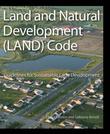土地与自然开发规范
2007-1
John Wiley & Sons Inc
Balmori, Diana/ Benoit, Gaboury
243
Land and Natural Development (LAND) Code offers a pioneering method to develop sites in harmony with natural processes that is solidly based on peer-reviewed scientific findings. While the LAND Code can be readily used in conjunction with LEED, EPA, and other guidelines, it features several unique characteristics, including: Recommendations based on peer-reviewed scientific research Rating scheme that weights each development and land use practice based on its environmental benefit and difficulty of implementation Straightforward, step-by-step system that is accessible to non-experts Focus on land rather than buildings Extensive use of photographs and diagrams to illustrate practices and procedures After an introduction, the book begins with chapters covering water, soil, air, living resources, energy, and materials. Throughout these chapters, the authors recommend tested and proven strategies that minimize disruption of the natural processes. Each chapter provides background, describes benefits for both developers and ecosystems, and recommends protective strategies in simple, non-technical language (a glossary is provided explaining all terms not in common usage). A toolbox of environmental engineering methods to implement the strategies follows, and the final chapter of the book provides a series of examples of actual development projects in which a variety of approaches have successfully attained sustainable development. With its emphasis on scientific understanding, the LAND Code offers you the information needed to make and implement decisions for ecologically sound land development.
DIANA BALMORI, PhD, is the founder of New York City–based Balmori Associates, a firm that is internationally recognized for its success in realizing complex urban projects that integrate innovative sustainability systems and patterns of use within an ove
Acknowledgments CHAPTER 1 INTRODUCTION What This Book is About Why This Book How to Use This Book How Land Code Points Were Determined How We Use the Term Sustainability How This Book Came About CHAPTER 2 WATER Site Drainage Impervious Surfaces Stormwater Quality Water Conservation and Reuse CHAPTER 3 SOILS Erosion Prevention and Control Soil Health and Integrity CHAPTER 4 AIR QUALITY AND MICROCLIMATE CHAPTER 5 LIVING RESOURCES Living Resources Conservation Plan Preserving and Restoring Habitat Buffering Critical Habitat Landscape Connectivity Road Placement and Design Native Species and Landscape Heterogeneity Selected Resources for Identifying Native and Invasive Species CHAPTER 6 ENERGY CHAPTER 7 INDUSTRIAL ECOLOGY AND MATERIALS CHAPTER 8 ENVIRONMENTAL ENGINEERING Erosion Prevention and Control Stormwater Management: Runoff Quality and Quantity Renewable Energy Computer Models CHAPTER 9 DIFFERENT PATHS TO SUSTAINABILITY Case Studies Points Checklist Glossary References Index
